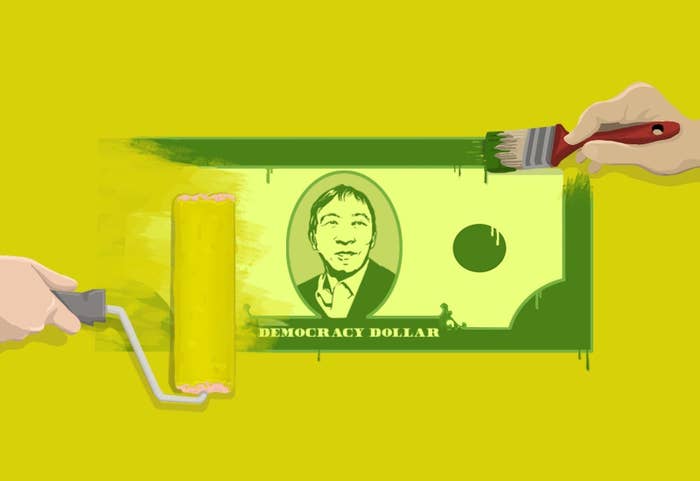
During Tuesday night’s Democratic presidential debate, one candidate after another came out in support of Universal Basic Income. Leading off was Andrew Yang, the tech entrepreneur who’s built his campaign on the idea of giving a “freedom dividend” of $12,000 per year — guaranteed income, no strings attached — to every adult American. Then, while discussing automation, former Housing and Urban Development secretary Julián Castro said he’d support a trial of UBI too. Rep. Tulsi Gabbard agreed, calling a guaranteed income a “good idea.”
When the evening was over, it was evident that Universal Basic Income — once a hobby horse among tech thinkers mapping out how to bolster workers left behind by technological change — is perhaps becoming something it hasn’t been since the Nixon administration: mainstream. But now that the current is picking up, UBI is swimming upstream in an unlikely place: Silicon Valley itself.
"I just don’t know if it will work."
“UBI is a worthwhile thing to consider, but I just don’t know if it will work,” one tech investor, who requested anonymity to speak freely, told BuzzFeed News. “I do worry about the ramifications, one of them is the slippery slope.”
If people can vote themselves $12,000 per year, the argument goes, they’ll soon vote themselves $24,000, and then more, until the incentive to produce competitive companies falls away completely. In Silicon Valley, where capitalists hold incentives sacred, a growing number of people are concerned that a potential solution to the economic system’s problems may destroy the system itself.
“You're creating a slippery slide transfer straight into socialism,” Naval Ravikant, a prominent tech investor, said of Yang’s UBI plan in a June podcast interview with Joe Rogan. “The moment people can start voting themselves money, combined with a democracy, it's just a matter of time before the bottom 51 votes themselves everything in the top 49.”
“Maybe UBI recipients don't get to vote at all,” Patri Friedman, chair of the Seasteading Institute, who is skeptical of Yang’s plan, told BuzzFeed News. “You have to take the power to vote yourself more benefits out of the hands of the people receiving the benefits. Otherwise, I think you do get that the slippery slope.”
Friedman, the grandson of Nobel Prize–winning economist Milton Friedman (himself a supporter of UBI), said he sees the merits of UBI. A guaranteed income, he said, could provide a social safety net more efficiently than our current welfare programs. But to implement it effectively, allowing people to vote themselves money, like Yang’s flat $12,000, would be the wrong way to go, he said. Friedman suggested another possibility: fixing the amount received as a basic income as a percentage of the federal budget or GDP.
Yang is “the only candidate who doesn't make me want to puke,” Friedman, who has received funding from billionaire Peter Thiel, said. “But if this is going to be a central plank, and he's gonna be a serious candidate, I'd like to see him address this.”
The former president of Y Combinator, Sam Altman, was an early Yang donor who commissioned a still-ongoing research study on UBI. Altman told BuzzFeed News that opponents of other forms of income redistribution made similar arguments in the past: “When the US income tax started, this was the exact argument,” he said. “I think most people in America still believe that it's okay to let people be successful. And I think if you re-even the playing field a little bit that spirit will come back more.”
Yang is “the only candidate who doesn't make me want to puke."
Altman, who favors UBI, said in exchange for a floor, he’d like to see no ceiling on earnings, as some, like presidential hopeful Vermont Sen. Bernie Sanders, have suggested. And like Patri Friedman, Altman suggested tying the amount of the basic income to a fixed percentage of GDP. “Right now, because people are rightly angry that there's no floor, and that most people have no real chance to be super successful, we sort of say billionaires are inherently evil,” he said. “I think it would be great to say, we as a society will allow trillionaires in exchange for a floor for everyone.”
Some in Silicon Valley are also questioning whether this is the right time for UBI, since widespread automation has yet to take root in the catastrophic way that some of them think UBI is meant to address. “It’s a non-solution to a non-problem,” Ravikant, who declined a BuzzFeed News interview request, told Rogan.
But Douglas Rushkoff, a tech thinker, documentarian, and author of Team Human, said it’s the exact right time. “When you hear that Mark Zuckerberg and Bill Gates are looking for ways to give back 90% of their wealth, it's because they took too much,” he told BuzzFeed News “This is a great way to put it back into the economy.”
Whether those in Silicon Valley like it or not, UBI, an idea hatched decades (if not centuries) ago and now embraced by some in the tech world, is now a real part of the political discourse. “It feels like it is more possible in the next few years than it has been in the past,” Amy Castro Baker, an assistant professor at the University of Pennsylvania, and a principal researcher in a UBI study in Stockton, California, told BuzzFeed News.
"We know that we have to have some things in place, that are going to maintain that safety net alongside a guaranteed income," Stacia Martin-West, an assistant professor at the University of Tennessee College of Social Work, and Baker's collaborator in the Stockton study, added.
“Thinking about what works, and how, and for whom, and under what circumstances is really important,” Baker said. “Because if we move forward, but without the science of knowing how to best implement, we could create other forms of inequality.”
